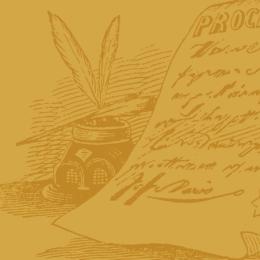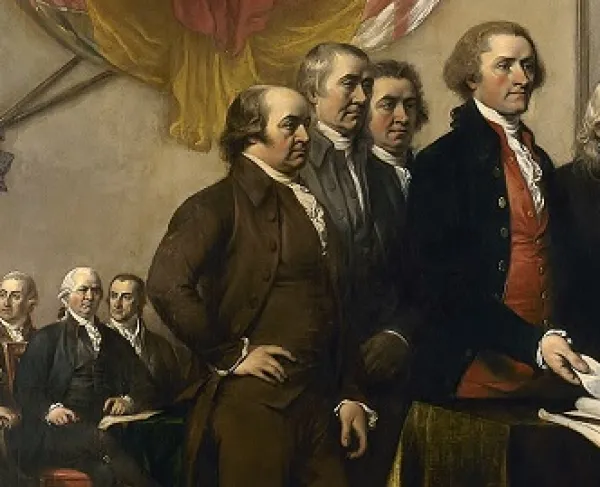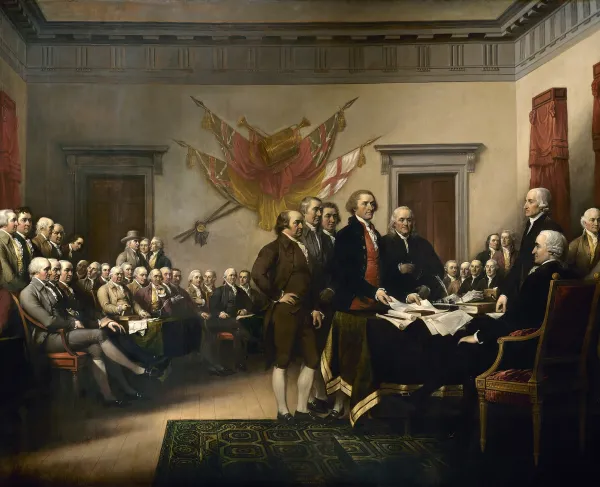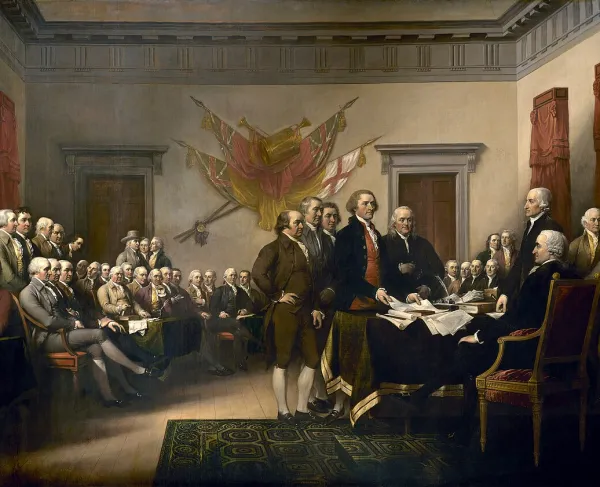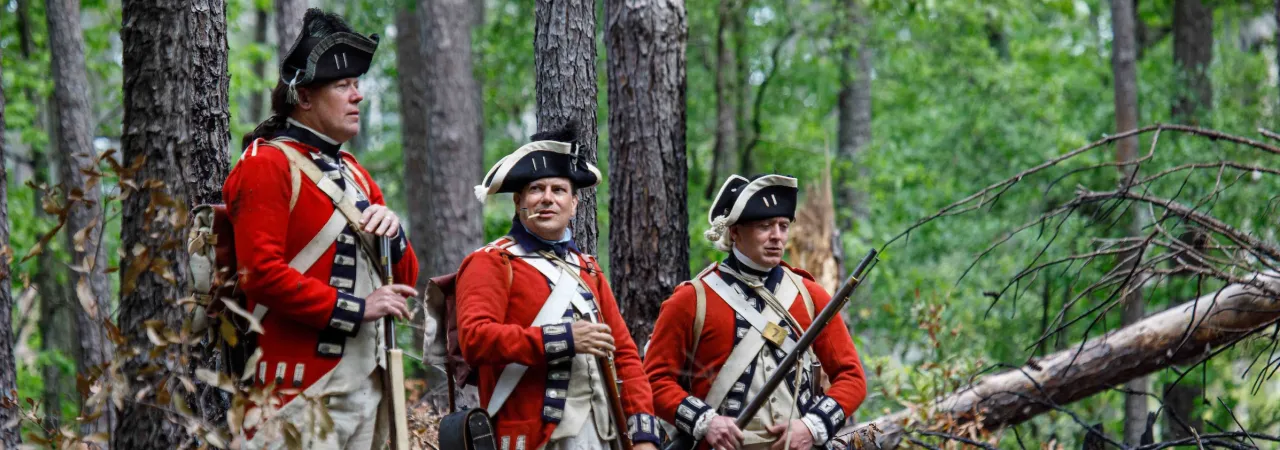
When the “embattled farmers” stood up against the British troops early on the morning of April 19, 1775, what were they fighting for? Those men may have given many answers that day, probably centered around righting wrongs with Parliament and the King’s ministers. One word they probably did not say was independence. Indeed, even after fighting had broken out, the Continental Congress in July 1775 sent what became known as the Olive Branch Petition directly to King George, seeking a peaceful end to the conflict. This petition was never acted upon, and the war continued. No less a person than Benedict Arnold said as much after he joined the British, reflecting on what made him take up arms first against them: “A redress of grievances was my only object and aim.”
Did the British themselves believe independence was the aim in 1775, long before it was declared in July 1776? Many did. One early observer of this had been engaged in battle against them at Bunker Hill, Captain Francis Lord Rawdon. Writing from Boston to his uncle, the Earl of Huntingdon, at home in December 1775, Rawdon complained:
Let the Rebels declare as much as they will that they have no thoughts of independency on Great Britain, their actions so palpably contradict that assertion, that every person of sense must see that it is only meant to prevent the reinforcements which we hope, & they fear…
As the war shifted from New England to New York City, it became harder to really conceive of the war being fought for any other reason. Numerous lives had been lost on both sides, with the Americans even attempting to conquer Canada. When that famous July day in Philadelphia ushered forth the Declaration of Independence, few British were surprised. Ambrose Serle, secretary to Royal Navy Admiral Lord Richard Howe, was a prolific diarist and noted the event on July 13, 1776:
The Congress have at length thought it convenient to throw off the Mask. Their Declaration of the 4th of July, while it avows their Right to Independence, is founded upon such Reasons only, as prove that Independence to have been their Object from the Beginning. A more impudent, false and atrocious Proclamation was never fabricated by the Hands of Man…’Tis impossible to read this Paper, without Horror at the daring Hypocrisy of these Men…
It did not help the cause of Congress when the first major action after the Declaration was the drubbing Washington’s forces took at the Battle of Brooklyn on August 27, 1776. British Major General James Grant, as zealous a commander as any that served in America, took a view probably shared by many, on both sides, writing to a fellow general in England shortly after the battle
if a good Bleeding can bring those Bible faced Yankees to their senses[,] The Fever of Independency should soon abate.” It did not. Scarcely a week had passed after Grant had put to pen to paper when three delegates from Congress, Benjamin Franklin, John Adams and Edward Rutledge agreed to meet with Lord Howe concerning an end to hostilities. Since Independence was not negotiable, the talks were doomed from the start, despite the politeness and cordiality of the meeting. Lord Howe’s secretary, Mr. Serle, simply noted in his diary “They met, they talked, they parted.
To be sure, some who had been in arms against the British had a change of heart once independence was declared. William Allen, who commanded a battalion of Pennsylvania Continentals in the Northern Army, resigned his commission days after the Declaration and the following year raised a battalion for the British. He was joined by Rudolphus Ritzema, the colonel of the 3rd New York Regiment, who stated his reasons to Britain’s Lord Pitt in 1784:
He is a British Subject, and wishes to die one. He was perhaps for a Moment, at the Commencement of the Troubles in America lead astray. He soon repented of his Error, and joined the British Banner. In doing this, he neither perjured himself, (for he never took a State Oath to the Americans, with some who now wallow in Pensions in England) nor did he basely desert the Cause he at first engaged engaged [sic] in, he boldly, in the Face of the Sun, resigned his Commission of Colonel of the third Regiment of New York Continentals, with this Reason assigned: – that he was averse to the Separation of the Empire.
Independence, of course, hit Loyalists the hardest. Many never believed the British would abandon them by acquiescing in a peace they had forsaken their homes and safety to prevent. The announcement of peace in New Yok City was met with stunned disbelief. On April 10, 1783, two days after the official proclamation was publicly read, Sarah Winslow, a refugee from Massachusetts, wrote to her cousin Benjamin Marston in Nova Scotia:
What is to become of us, God only can tell, in all our former sufferings we had hope to support us, being deprived of that, is too much, my mind, and strength, are unequal to my present, unexpected trials—was their ever an instance my dear Cousin, can any history produce one where such a number of the best of human beings were deserted by the Government they have sacrificed there all for. The open enemies of Great Britain have gained their point. … This peace brings none to my heart.
While Sarah Winslow mourned the loss of her native land, at least as she had known it, the Reverend Jonathan Odell of New Jersey was more hopeful. Odell was an ardent Loyalist, having served as chaplain to two Loyalist corps in the war, and as late as 1782 referred to independence as a “phantom.” Once all matters had been decided, the minister expressed his hopes:
the United States of North America will now be established in the possession of an uncontroverted and unlimited Independency, with a very great extent of territory. Whether, in point of political happiness, they are, all things considered, to be gainers by such a revolution, is a question that must be left for Experience to decide. But, surely, every good man must wish that their Conduct, in the present critical and important moment, might be directed by that Spirit of prudence, integrity and honor, which alone can promise them the future enjoyment of national prosperity.
As a prescient epilogue, George Hanger, a British officer who served as major under Banastre Tarleton in the British Legion, made this observation at dinner in America at the end of the war, commenting on the future of a newly independent United States:
as long as General Washington, and the other principal military characters and leading men in Congress, who have brought about this revolution, are alive, the government will remain as it is, united; but, when all of you are in your graves, there will be wars and rumours of wars in this country: there are too many different interests in it for them to be united under one government. Just as this war commenced, you were going to fight amongst yourselves, and would have fought, had the British not interfered: you then, one and all, united against us as your common enemy; but, one of these days, the Northern and Southern powers will fight as vigorously against each other, as they both have united to do against the British.
Sadly, 78 years later, he was proved correct.
